- Home
- Brian Garfield
Deep Cover Page 7
Deep Cover Read online
Page 7
It was an ultramodern house of glass, open to the space about it, not especially large; one of those Southwestern houses without basement or attic, temporary-looking because it was temporary.
The front door of the house opened, throwing a splash of lamplight across the steps, and Colonel Bill Ryan came out beaming.
Ryan had always been big and now he was a big man with a belly on him. He had thick shoulders and a deep chest; a square head anchored on a wide neck. He was wearing a loud Hawaiian shirt, white tapered slacks, white loafers, no socks. He was crowding fifty but he had the kind of durably boyish face often discovered on mercenary soldiers and airplane pilots. The hair on top, sandy and going thin, was combed carefully over the pink scalp.
“About God damn time you remembered to call on your old friends.” He marched forward to pump Forrester’s hand and clap him violently on the bicep.
Ronnie was getting out of the car and Forrester saw the way Ryan’s unsubtle grin widened with the quick shift of focus that bracketed them both in the single frame of his vision. “Yes indeed,” Ryan said, full of approval, bowing over Ronnie’s hand with an amusingly courtly gesture. Ronnie smiled pleasantly and said she had heard a lot about him. Ryan’s laugh expanded his throat. “That’s a shame—I was hoping we could be friends.”
There was a shriek of lusty delight from the house and Forrester wheeled in time to see Alice Ryan rush breathless down the steps. “Why didn’t you tell me they were here? Alan, darling, it’s been so long!” She planted a warm wet kiss full on his mouth. Her assault almost knocked him back against the car and he laughed, untangling himself, but when he caught Ronnie’s glance he felt color flood his face. Alice Ryan stepped back and looked him up and down, and then Ryan cleared his throat and introduced her to Ronnie. Forrester saw the way Alice’s expression changed immediately, became speculative, the assessment of the predatory female for one who might prove to be a competitor. Alice was a small fluffy blonde, husky and pneumatic, with a sun-whacked face that tended to pout. Her aura was frankly sexual; she gave an. impression of greedy appetites and single-track intentions. She wore a pleated black skirt and a bolero half-jacket, bare at the midriff, with slinky black sleeves that covered her plump arms. She was slightly overweight but it hadn’t gone to her waist; it only emphasized the roundness of her hips and buttocks, the ripe thrust of her breasts. She had the hoarse breathy voice of the casual alcoholic.
They went inside amid a great deal of chatter, both Ryans trying to talk at once. Forrester felt curiously detached, unable to enter into the spirit of hearty reunion; he had always liked Bill and Alice, had always been at; ease with them, but up to now they had been friends with no outside issues to color the relationship.
The room was self-consciously new, deliberately underfurnished, with large expanses of parquet floors and vastnesses of plate glass. The obligatory display case of a commanding officer; but in it, Bill Ryan looked alarmingly out of place.
There was a mild confusion of choosing seats and talking loudly across the room while Ryan, mixed strong drinks and served them with Alice trailing him around distributing napkins and appetizers from a wooden tray. Forrester marked the contrast between all this and the cluttered pillowy comforts of the quarters Ryan had inhabited in his throttle-jockey youth. In those days they had sat around a kitchen table drinking beer from cans.
They were feeling each other out like strangers. Alice’s bouncy enthusiasm was forced, she was drinking too fast, and Ryan was putting on a hearty front but he was searching for things to talk about and there was too much postmorteming of old times. Ronnie was the only real stranger here but it wasn’t her presence that made for the awkwardness; Ronnie seemed to fit in more easily than any of them—perhaps because she did not try too hard.
Alice fluttered nervously in and out of the kitchen, preparing to serve dinner. Once Forrester heard the crash of porcelain from the kitchen and Alice’s explosive curse. Ronnie hurried to the kitchen door—“Won’t you let me help?”—but Alice snapped at her: the kitchen was too small for two, she had everything under control; the words did not convey the meaning in her shrill tone. Ronnie returned to her seat, subdued, and Ryan made a clumsy effort to cover the moment with a hurried joke. But when Alice appeared Forrester did not miss the tight-lipped turn of Ryan’s face or the sulky glance Alice threw him.
Dinner was equally awkward and Forrester felt saddened by the sense of disintegration. Prism lights, recessed in the fake-beamed ceiling, threw too much bland illumination across the table, showing up the tremor of Ryan’s hands as he ate the telltale thread of moisture on Alice’s pouty upper lip. The meal was delicious and perfectly served but Alice hardly touched it; she sat pushing her ice cubes around with a wooden chopstick. Ryan tried to keep a Conversation going but Forrester caught him gritting his neat white teeth.
In the end Forrester felt ashamedly stupid: it had taken him too long to realize they were nervous and Upset because they were in the presence of a United States Senator. He made the discovery in a remark Ryan let drop; a moment later he could no longer remember the remark itself but he knew what he should have known all along. They were commoners in the presence of royalty; Ryan was an unhappy Falstaff whose Hal had become king.
He took no comfort from the discovery; he could see no way to put them at their ease. It made him quietly miserable. Over coffee he caught Ronnie watching him with kind compassion: she understood, but it was not her place to break the ice. Nor, he realized, was it his. He was in fact a Senator and there was no way on earth to deny it or change it.
Ronnie wanted to help with the dishes but they wouldn’t let her. Ryan helped his wife carry things out to the kitchen. Forrester heard water running in the sink, the clatter of washing up, the hiss of Ryan’s sibilant berating, Alice’s strident, contentious, carelessly drunken reply: “All right! Just once, let’s do things my way, all right? Get back in there and act like a host.”
Forrester turned away when he heard Ryan’s step; he began to speak to Ronnie, pretending he hadn’t heard. Ronnie put her hand on the table, forming a loose fist; he had the feeling she would have touched his hand if they had not been separated by the width of the dining table.
Ryan came in red-faced, trying to beam. “How about a little snort of brandy to go with that coffee? Whaddya say, buddy? Mrs. Tebbel?”
“Please call me Ronnie. No, no brandy for me, thank you.”
“How about you, buddy? Not going to let me down, are you?” Ryan’s grin was painful. He had started to clap Forrester on the shoulder but thought better of it. He wheeled furiously toward the bar without waiting an answer. “Got some real fine Havanas here. Old buddy of mine flew them in from Guantánamo.”
They left the table and settled around the phony brick fireplace. Forrester heard the click of the refrigerator door and in a moment Alice arrived from the kitchen, unsteady on her feet, carrying a tall glass full of ice cubes and whiskey. Ryan launched into another Good Old Days monologue with heavy jocularity but rapidly ran down, dragged on his cigar and jetted smoke, and finally squirmed in his chair and said, “Time to go from the preamble to article one. This damn house hasn’t got much more than this one room. You want to exile the ladies to the bedroom or take the cigars out on the patio?”
Alice muttered something unintelligible and Ryan professed not to hear her; he got up and said, “You gals mind entertaining each other for a while?” and marched toward the sliding glass doors at the back of the room.
Ronnie smiled up at Forrester. “Go on, now. We’ll get along fine.” It was a lie and everyone knew it except Alice, who was filing her nails with an emery board, sulking, nearly drunk enough to pass out or go into a crying jag. Forrester did not want to leave Ronnie with that on her hands but this was important. He said, sotto voce, “I’m sorry, Ronnie,” and went out onto the patio after Ryan.
Ryan had turned the outdoor lights on. “No bugs this time of year. I love it out here on the flagstones. But if you get chilly I’
ll hunt up a sweater.”
“This is fine, Bill.”
Ryan slid the doors shut, closing them out. “Sit down, sit down. Want another drink before we start the brouhaha?”
“No, thanks.”
“Neither do I. Well then, old buddy, let’s have at it.”
“You don’t like this, do you?”
“Oh, hell, don’t mind any of this. I don’t like anything right now. It’s a bad patch. Alice and me, I don’t know—it seems to’ve become nothing more than some kind of incessant bargaining. And this stinking job of mine …”
“What’s wrong with it? It’s a pretty important job.”
“Nuts. I’m just marking time here. It’s a dead end. This command’s supposed to belong to a brigadier general, you know. I’m just filling in until they find themselves the right general to take it over.”
“Maybe they’ll give you a star.”
Ryan snorted. “I don’t expect to get another promotion before World War Four.”
“Why not? You’ve got a good record.”
“As a pilot, buddy. As a pilot. But I started in P-51’s and that’s the kiss of death; now I’m overage and I’m just an embarrassment to have around. They take people like me and shuffle us around from one boondock job to another until it’s time to retire us gracefully and forget us. I’m just sitting around waiting to be put out to pasture; but by God I hate being thrown out like an old shoe. I hate it. Do you know what I am down here? A pencil pusher. They’ve got a SAC wing commander to run operations and an ICBM wing commander to run the silos and all I do is take care of the real estate for them.”
“You’re not an old man. You can do anything you want. A new career with your retirement pay for a cushion. Look at all the retired officers who’ve made successes of themselves.”
“Doing what? Figureheading some corporation with hot defense contracts? Playing politics with the old buddies in the Pentagon to keep those contracts up? Not me. I’m an airplane jockey and that’s all I’ve ever been. You know that last Pentagon tour of duty cooked my goose. If you’re a colonel in this business and you want to be a general you’ve got to charm the generals’ wives and when it comes to that I’m about as adroit as a bull in a china shop. I hate every bit of it—I always have. Always having to choose your friends by rank. You can never win a game of golf or a game of bridge against a superior officer but you’ve always got to know how to play well enough to make it look good. You can’t get mad if a drunken superior starts to paw your wife. You spend your whole life going to drinking parties where nobody’s got anything to say and you watch them turn your wife into a rank-conscious drunken bitch.”
Ryan took the cigar out of his mouth. He had bitten it in two. He spat the stub into his hand and hurled it over the patio wall into the night.
“Look, buddy, do me a big favor. Forget everything I just said. Once a year a guy has a right to get maudlin but I didn’t mean to dump it all over you. I swear I won’t do it again. Now let’s talk about what you came up here to talk about. I saw you on the TV last night—that little speech of yours must’ve shook the striped pants off some diplomats.”
“Did it shake yours off?”
“I’m on your side. I think the fat cats are too fat. About time somebody talked about trimming some of it off.”
“What do you know about the Phaeton system?”
“Enough.”
“How much is enough?”
“Buddy, I am bound by Title Eighteen of the National Security Act.”
“I’m cleared for Top Secret information. Do I have to show you my clearance?”
Ryan flushed. “Of course not, Senator.”
“Don’t do that. I didn’t come up here to muscle you.”
“Exactly what did you come for?”
“Two things. First, where do you stand on Phaeton?”
“Personally? I just told you. I think the damn thing’s a waste of time, a waste of money, and a potential catastrophe.”
“Will you testify to that effect in front of a Senatorial hearing?”
“No.”
It made him sit up. “No?”
“Maybe if I had three stars I could get away with something like that. Just maybe. But I don’t have three stars. Just a pair of scrawny turkey buzzards on the shirt collars of my uniforms.”
“You’re a front-line operational officer, Bill. You’re in command of a strategic base. You’re more closely in touch with the immediate problems of this kind of thing than anybody else. Why shouldn’t your word carry weight?”
“Because in my business we’re not allowed to have public opinions unless they happen to coincide with the official line of the department. Even the liberal politicians insist on keeping military types out of politics. If I open my mouth in public hearings there’ll be nothing left of me but a small wet spot on the pavement.”
“You’re not trying to tell me they’d court-martial you.”
“What do you think they cashiered Billy Mitchell for?”
“For God’s sake, Bill. That was more than forty years ago.”
“And you think they’ve changed any in that period of time, the big boys with the omelettes on their hats?”
“Come on, Bill. You’ve got to do better than that.”
“It’s a taut community. People don’t like to hear any questions about anything at all. They particularly don’t like to hear questions from snot-nosed junior officers. Mitchell was a brigadier, Alan. I’m not even that high on the totem pole. Maybe they wouldn’t court-martial me but they’d make it so life wasn’t worth living, in or out of the service. They’d see to it I couldn’t get a job doing so much as grease-monkeying a cropdusting plane anywhere in the country. You better believe it, buddy. Rank Has Its Privileges, and among those privileges is the good old blackball. One twitch of a government digit and my head rolls—that’s all it takes. No. You don’t get me to testify. And I won’t use this as an excuse but I’ll mention it for what it’s worth—even if I did testify for you I’d do more harm than good. They’d scrape up enough embarrassing items from my record to discredit me as a reliable witness and they’d probably throw in eight scientists and fourteen four-star generals to counteract my testimony anyway. You think about that, because this little job you’ve picked is about as easy as trying to mate a chimpanzee with a porcupine. No way, buddy, no way.”
Ryan sank his teeth into the remains of his cigar and blew a rancid cloud of smoke. “Now what was the second thing you came for?”
There was no arguing with him, he had the stubbornness of an elephant in heat.
“I want to inspect the missile complex.”
“Why not? That’s your privilege—you’re on the Military Affairs Committee.”
“This isn’t just a junket for the benefit of the press. I want to go through the whole system with a fine-tooth comb.”
“What for?”
“Holes in the system.”
“You won’t find any. There’s no leaky radioactivity and you won’t find any loose buttons lying around where some kook could set them off.”
“I know all about the fail-safe systems. I have a feeling they can be cracked.”
“What do you mean by cracked?”
“Any security system can be breached.”
“Who by? What for?”
“The country’s crawling with extremists at both ends of the spectrum. You don’t have to look too far to find a crowd of jokers with wild-eyed notions—how many officers have you got on this base right now who belong to right-wing fanatic groups, the ones who see Communists under every rock? Look at the equipment they’ve got here at their finger tips.”
“Nuts. If the command doesn’t come down from the top the system doesn’t fire.”
“Right now it doesn’t but I can’t believe a security system that tight can be applied to anything as complex as the Phaeton. Rednecked right-wingers or left-wing activists or sheer accident—it doesn’t matter what triggers it off. The system�
��s just too unwieldy.”
Ryan shrugged elaborately. “I hope you’re wrong. I’ll get in touch with Fred Winslow, he’s the Deputy ICBM Wing Commander—we’ll get passes for you to inspect the setup. When do you want it?”
“As soon as you can. I’ll want to bring a couple of people along—one of my staff people and a scientist.”
“They cleared for Top Secret?”
“Yes.”
“Who’s the scientist?”
“Moskowitz.”
“He was on the Titan development program, wasn’t he? What makes you think he’ll play along?”
“I’ve talked to him.”
“Who’s the other one?”
“Jaime Spode.”
Ryan beamed. “Top Spode? He still around?”
“Still around, still the best.”
Ryan nodded. Evidently he had run out of things to say. Forrester got to his feet. “If you like I’ll come to your office next time—I didn’t mean to upset anything for you and Alice. I know this is awkward.”
“You didn’t upset anything that wasn’t upset before. Forget it. It’s not that you’re a Senator, it’s that we’re none of us the same as we used to be. Which leads me to ask what it is that you expect to get out of this Phaeton fight besides a lot of bruises and an early retirement.”
“Maybe I’m tired of going through the motions—maybe I just feel like making waves for a change.”
“Nuts. I think you want the top spot and you’re gambling that this will buy it for you.”
It pulled Forrester’s head around: he caught the sudden brightness of Ryan’s fierce grin.
“Well? Isn’t that it?”
“You’re off base by a mile.”
He despised his evasiveness but that was the way the game was played. What could he say to Bill Ryan now—that he thought Alan Forrester would make a good President, that with the radical polarization of strident extremists the only hope was for a calm, decisive, rational, patient middle-of-the-roader to come out of the woodwork before the country splintered altogether into factions and brought a führer to power?

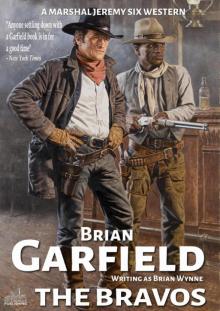 Marshal Jeremy Six #3
Marshal Jeremy Six #3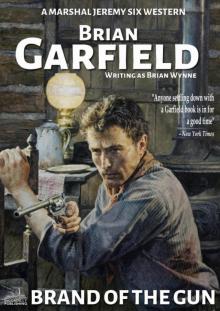 Marshal Jeremy Six #6
Marshal Jeremy Six #6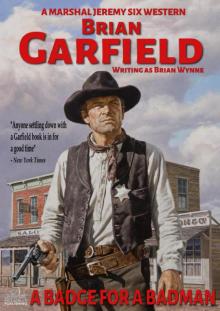 Marshal Jeremy Six #5
Marshal Jeremy Six #5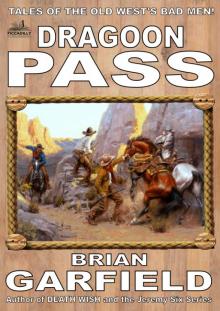 The Outlaws 2
The Outlaws 2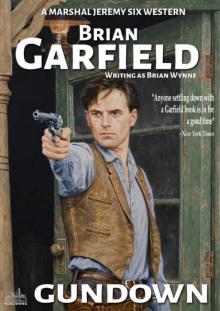 Marshal Jeremy Six #7
Marshal Jeremy Six #7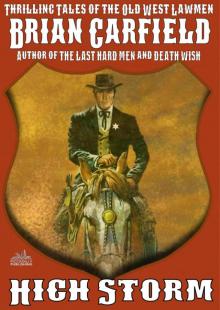 The Lawbringers 4
The Lawbringers 4 Marshal Jeremy Six #4 the Proud Riders
Marshal Jeremy Six #4 the Proud Riders The Romanov succession
The Romanov succession Marshal Jeremy Six #8
Marshal Jeremy Six #8 Sliphammer
Sliphammer Line of Succession
Line of Succession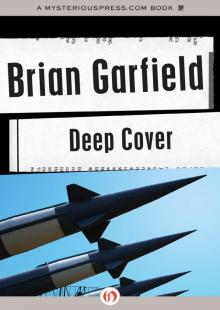 Deep Cover
Deep Cover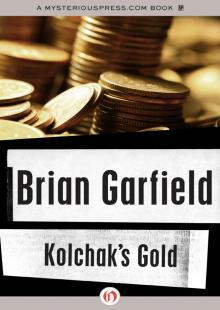 Kolchak's Gold
Kolchak's Gold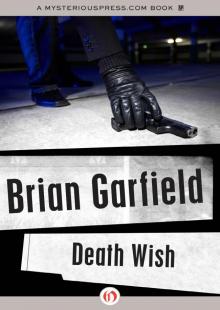 Death Wish
Death Wish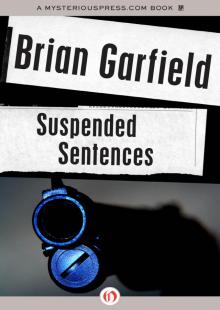 Suspended Sentences
Suspended Sentences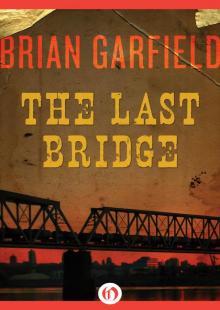 The Last Bridge
The Last Bridge Relentless
Relentless The Vanquished
The Vanquished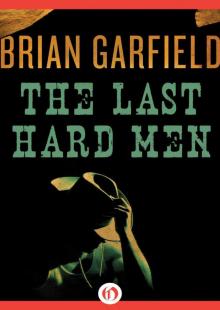 The Last Hard Men
The Last Hard Men Hit and The Marksman
Hit and The Marksman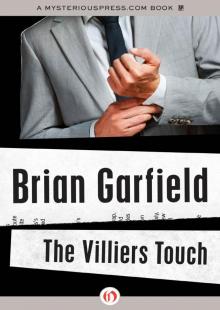 Villiers Touch
Villiers Touch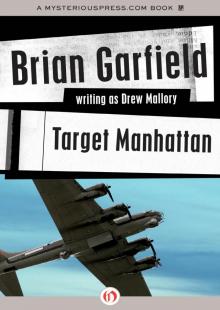 Target Manhattan
Target Manhattan Marchand Woman
Marchand Woman What of Terry Conniston?
What of Terry Conniston? Threepersons Hunt
Threepersons Hunt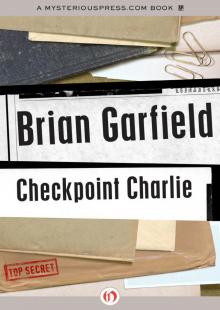 Checkpoint Charlie
Checkpoint Charlie Romanov Succession
Romanov Succession Necessity
Necessity Death Sentence
Death Sentence Fear in a Handful of Dust
Fear in a Handful of Dust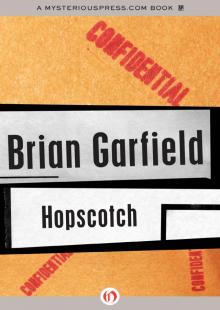 Hopscotch
Hopscotch